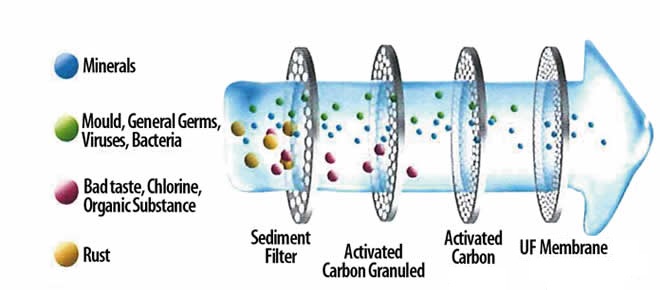Water purifier is a device that helps in removing undesirable chemicals, biological contaminants, suspended solids, chemical and odours from contaminated drinking water, coming from sources like river, ground water and municipality supplies. It work on the mechanical principle of first siphon off raw water contaminated from tap, overhead tanks or bore-well, then filter out impurities ranging from sediments to micro-organisms and then dispense clean water for drinking.
Table of Contents
Purification Technologies used in Water purifier:
Modern water purifiers use one or a combination of the following methods:

Reverse Osmosis (RO):
Reverse osmosis (RO) is a water cleansing procedure in which water is constrained through a semi-penetrable layer or membrane that removes 90-99% of water impurities. After this process water is free of minerals and different contaminants.
The amount of dissolved solids a unit is capable of removing, depends on Membrane type. For example, Cellulose Tri-Acetate (CTA) membranes remove 88-94%, Thin Film Composite (TFC) membranes remove between 94-98% of dissolved solids, and Hi-S Membranes have higher removal rates, between 97.5-99%.
What it eliminates:
- Dissolved impurities
- Inorganic compounds
Not Effective in Removing:
- Bacteria and virus
- Solvent minerals
- Organic compounds
Also Read: Why Does One Need A Water Purifier?
Ultraviolet Filtration (UV):
Ultraviolet water purification is one of the methods for disinfecting microorganism or bacteria or virus from the water. Ultraviolet (UV) rays penetrate harmful pathogens in water and destroy illness-causing microorganisms by assaulting their genetic code and eliminating their ability to breed. Disinfecting your water with UV ray is exceptionally effective and environmentally safe.
Ultraviolet systems destroy ninety nine percent of harmful microorganisms while not adding chemicals or changing your water’s taste or odour.
What it eliminates:
- Bacteria and virus
Not Effective in Removing:
- Heavy metals like arsenic, nitrate, iron
- Odours
Here are Five Reasons To Own A Water Purifier
Ultra Filtration (UF):
Ultrafiltration (UF) is a type of membrane filtration in which hydrostatic pressure forces a liquid against a semipermeable membrane.
Under this process suspended solids and solutes of high relative molecular mass are remembered, whereas water and low relative molecular mass solutes permit through the membrane.
Ultrafiltration is not fundamentally different from RO, microfiltration or nanofiltration, apart from the size of the molecules it retains.
What it eliminates:
- Suspended solids
- Organic compounds
Not Effective in Removing:
- Bacteria and virus
Planning to buy a Water purifier for home? Here is some Helpful Tips To Choose The best Water Purifier
